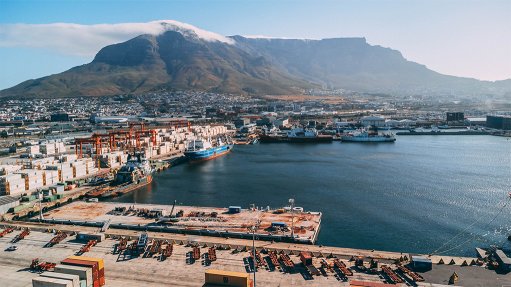TGSI piloted in Tshwane will benefit people with disabilities
This article has been supplied as a media statement and is not written by Creamer Media. It may be available only for a limited time on this website.
Company Announcement - Crossing the street or negotiating an intersection for most people is a simple, straightforward process with caution paid to the obvious dangers. But for others with disabilities and especially those visually impaired, the task presents some serious challenges, often deterring them from using urban infrastructure altogether. Frano Combrinck, Project Technologist in the Traffic and Transportation team at GIBB, has for years stressed the importance of Tactile Ground Surface Indicators being developed as a universal norm in South Africa, and it appears that his efforts are finally paying off. “Although Non-Motorised Transport is recognised as a valuable component of transportation systems, it has historically not been included in traditional transport planning, with walkways and cycle paths generally implemented as afterthoughts, and sometimes, not at all. There was also little infrastructure to accommodate the needs of the physically challenged (the elderly, people in wheelchairs, the blind, deaf and young children) and this is now being addressed by applying the principles of universal access in all transport projects,” he said.
TGSI’s is a way-finding system included in external or internal pedestrian surfaces to help guide pedestrians and define routes. They also warn a pedestrian of imminent hazards, such as warning the pedestrian of a dropped curb at a pedestrian crossing. Leading South African-owned engineering consulting firm, GIBB, has earned a reputation for its “out of the box” innovation and engineering excellence, and TGSI’s has been flagged for its benefits to people with disabilities.
The first of the projects has been piloted in the City of Tshwane where sidewalks were developed with the nodes required for people with disabilities and specifically the visually impaired to be able to commute with less risk. “Universal access or design improves facilities for people of all ages, at different stages of their lives and health and there is urgency around making infrastructure accessible to all – this is the true essence of Ubuntu,” he said. To achieve this, Combrinck said that essentially, the removal of obstacles that can hinder trying to move from Point A to Point B is crucial. Combrinck was introduced to TGSI’s while working in London twelve years ago, and concedes that while South Africa has some way to go in making our roads universally accessible, there is certainly a bigger focus on it now. In his experience, Combrinck said that South Africa is at least twenty years behind in terms of universal access to urban developments.
“With some first world countries, there are technologies built into tactiles that send out a signal to another device clipping automatically onto their cane, and that vibrate when a visually impaired person’s staff is close to the crossing, warning him or her of imminent danger. Of course, there is a long way to go for the complete roll-out of tactile crossings, but government is seeing the importance of this for social upliftment and is working toward the ultimate goal of boasting world-class urban infrastructure,” he said. The City of Tshwane hosted an orientation for members of the SA National Council for the Blind recently, where blind and partially sighted people experienced first-hand, the convenience of TGSI. Chris Budeli, Manager: Education, Social Inclusion and Development for the SA National Council for the Blind said, “It is our duty to ensure that the lives of the blind and partially sighted are improved and the implementation of the TGSI is a positive move that will bring positive change to them. Blind and partially sighted persons who experienced the TGSI in Tshwane found that the TGSI helped them in identifying safe areas to cross as well as direction from one side of the road to the other.”
He added that the TGSI would also contribute in allowing blind people to explore their environment, have more land marks to find shops and places that they need to visit from time to time and be able to give each other directions. The MyCity project in the Cape as well as the A Re Yeng, Tshwane’s Bus Rapid Transit (BRT) will receive the biggest single tactile focus in South African history and according to GIBB’s prescribed world-class standards, endorsed by the National Department of Transport.
The City of Johannesburg have also adopted the tactile layout and design into their complete street guidelines and will incorporate it into the extensions of the Rea Vaya project.
Comments
Press Office
Announcements
What's On
Subscribe to improve your user experience...
Option 1 (equivalent of R125 a month):
Receive a weekly copy of Creamer Media's Engineering News & Mining Weekly magazine
(print copy for those in South Africa and e-magazine for those outside of South Africa)
Receive daily email newsletters
Access to full search results
Access archive of magazine back copies
Access to Projects in Progress
Access to ONE Research Report of your choice in PDF format
Option 2 (equivalent of R375 a month):
All benefits from Option 1
PLUS
Access to Creamer Media's Research Channel Africa for ALL Research Reports, in PDF format, on various industrial and mining sectors
including Electricity; Water; Energy Transition; Hydrogen; Roads, Rail and Ports; Coal; Gold; Platinum; Battery Metals; etc.
Already a subscriber?
Forgotten your password?
Receive weekly copy of Creamer Media's Engineering News & Mining Weekly magazine (print copy for those in South Africa and e-magazine for those outside of South Africa)
➕
Recieve daily email newsletters
➕
Access to full search results
➕
Access archive of magazine back copies
➕
Access to Projects in Progress
➕
Access to ONE Research Report of your choice in PDF format
RESEARCH CHANNEL AFRICA
R4500 (equivalent of R375 a month)
SUBSCRIBEAll benefits from Option 1
➕
Access to Creamer Media's Research Channel Africa for ALL Research Reports on various industrial and mining sectors, in PDF format, including on:
Electricity
➕
Water
➕
Energy Transition
➕
Hydrogen
➕
Roads, Rail and Ports
➕
Coal
➕
Gold
➕
Platinum
➕
Battery Metals
➕
etc.
Receive all benefits from Option 1 or Option 2 delivered to numerous people at your company
➕
Multiple User names and Passwords for simultaneous log-ins
➕
Intranet integration access to all in your organisation


















